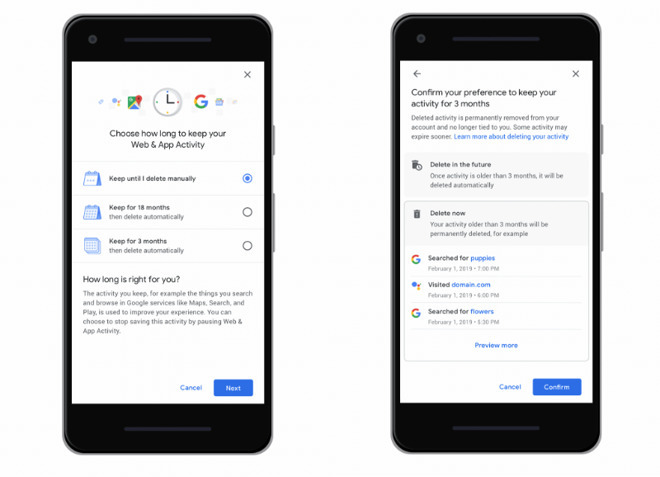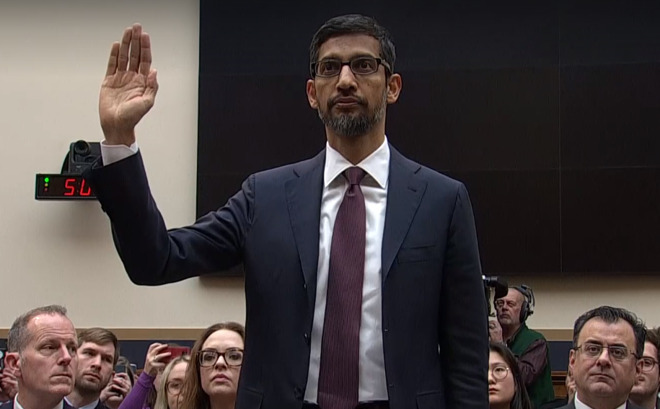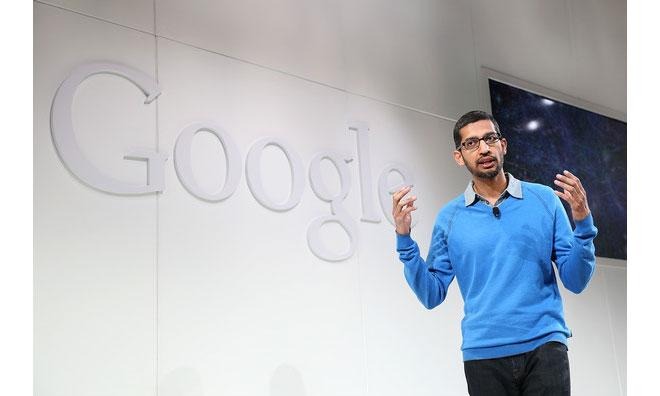Google CEO Sundar Pichai frames Google as a protector of its users' information, but until the search giant stops using identifiable data to power its advertising, it is far from being a bastion of privacy.
On Tuesday, Google's IO developer conference attempted to spell out Google's approach to privacy, hyping it as a company that cares about its users' data and would go to lengths to keep it safe. In an opinion piece published on Wednesday, Google CEO Sundar Pichai attempted to continue the narrative at length.
"Trusted" to protect user privacy
In the New York Times opinion piece titled "Privacy Should Not Be a Luxury Good," Pichai sets out an argument that the search company does use data to make its products "more helpful for everyone," but at the same time Google also goes to lengths to "protect your information."
Calling Google's position one of privilege due to billions of people using the company's services like Search, Chrome, and Android on a daily basis, Pichai insists the trust from consumers is one it matches "with a profound commitment to responsibility and a healthy dose of humility."
Privacy is "one of the most important topics of our time," the CEO states, before suggesting that while people are "rightfully concerned" about how their data is used, their individual definition of privacy varies. While a family sharing a device may want privacy from one another, a shopkeeper sees it as keeping customer data secure, while others may view a need to delete data in the future as their definition for the term.
"Privacy is personal, which makes it even more vital for companies to give people clear, individual choices about how their data is used," he writes.
Citing 20 years of Google being used for a variety of services by users trusting it, Pichai claims the company has "worked hard to continually earn that trust by providing accurate answers and keeping your questions private. We've stayed focused on the products and features that make privacy a reality - for everyone."
A core philosophy of Google's is "For everyone," meaning that products have to be universally accessible to anyone who may use them. "Our mission compels us to take the same approach to privacy," according to the CEO, with privacy not to be considered a "luxury good offered only to people who can afford to buy premium products and services."
As an example, Pichai refers to how the normal free version of YouTube has many privacy controls built in, even though the paid YouTube Premium doesn't offer advertising. The introduction of Incognito mode from Chrome into YouTube allows for access to the video streaming service without linking activity to the user.
Real, meaningful data choices
Pichai then turns to how Google makes privacy "real," with "clear, meaningful choice" about data. "All while staying true to two unequivocal policies: that Google will never sell any personal information to third parties; and that you get to decide how your information is used."
As a simplified way of how Google's policies work, Pichai first explains data is used by its services to provide responses to queries or to perform tasks. The services use "anonymous data in aggregate," meaning it is data that cannot be connected to an individual, especially at the scale of the data being used.
A more important "small subset of data" is used for serving advertising relevant to the user, with revenue going to Google and a "broad community of content creators." The data subset used to serve ads could be based on previous searches or browsing habits, but Pichai highlights it cannot include data entered into apps, like the contents of Gmail messages or Google Docs.
"Still, if receiving a customized ads experience isn't helpful, you can turn it off," Pichai admits. "The choice is yours and we try to make it simple."
Referencing earlier options to export data from Google services and the creation of the Google Account page for reviewing privacy controls, Pichai brings up the recent addition of an auto-delete function for some user data after a specified period of time. The introduction of a security key for Android devices that can provide two-factor authentication is also brought up as a privacy-defending advancement.
 Google recently added options to automatically delete Web and App Activity, as well as Location Data
Google recently added options to automatically delete Web and App Activity, as well as Location DataGoogle is also said to be working on minimizing data in general, and is leaning on "federated learning," a concept from AI research that allows for services to improve and learn without requiring raw data from a device. "In the future, AI will provide even more ways to make products more helpful with less data."
Pichai ends his opinion piece by raising the need for legislative bodies and institutions to collaborate and support privacy. Referencing how Europe "raised the bar for privacy laws" with the introduction of GDPR, Google believes the United States would benefit from its own "comprehensive privacy legislation," and has urged Congress to make it federal law.
"Ideally, privacy legislation would require all businesses to accept responsibility for the impact of their data processing in a way that creates consistent and universal protections for individuals and society as a whole," Pichai suggests, before claiming Google is not waiting for legislation to be put in place.
"We have a responsibility to lead. And we'll do so in the same spirit we always have, by offering products that make privacy a reality for everyone."
Not the entire truth
Google talked a big game at Tuesday's IO conference. It heralded moving Assistant queries on-device, and a few other things that, in theory, will help user privacy.
But, we stopped counting after Google explicitly said that it was taking measures to protect your data from app developer collection after six mentions. At no point during the proceedings did it say anything about protecting your data from Google itself.
Pichai's narrative on Wednesday in the Times just confirms that. He's not wrong about all of the things that Google does with data that are beneficial like road traffic data aggregation, and the like. But, he's also not mentioning that Google already has a massive profile on all of its users, best demonstrated by requesting what the company knows about you now.
Google uses this data to make gobs of money, and Pichai just skims over that. As Google has collected this data, in the interest of reaping billions, it has generated a vicious cycle of those targeted ads, which are absolutely a use of consumer data without permission.
 Pichai testifying to a US congressional panel in December denying accusations Google searches are politically biased.
Pichai testifying to a US congressional panel in December denying accusations Google searches are politically biased. Over the years, these targeted ads have generated more money for Google as it, at the same time, reduces revenue to creators year after year. This in turn, forces more ads by publishers, annoying users in the process. Because of all this, Pichai is the head of the company that is has been forcing the internet's collapse into a handful of billion-dollar mega-corporations that have economies of scale that the lesser entities can only dream of.
Apple has more users than ever before in its entire history, and this has only escalated. The gravestones on the Apple-centric media road — a road that should be epic and sprawling given 1.4 billion devices in active use daily — are a good microcosm of Google's actions towards creators. And, there is a burgeoning resistance on Alphabet's YouTube about the same thing now. "Free" internet, indeed.
Pichai's right — privacy shouldn't be a luxury good. Given that you can buy an iPhone, new, for what the new Pixel 3e costs, and a used or refurbished one for far less even internationally, it still isn't, and hasn't been for some time. The iPhone SE is cheaper, and faster, for instance, but falls short in the camera department. So, not only is this lip service to privacy not enough, it's also too late, since Google has that massive trove of data already. And, that trove is only getting bigger.
By default, all of these Android phones require users to explicitly opt-out of data collection, and 99% of the world's users won't turn it off, because they don't know how, or don't know it's an option. Don't these users deserve privacy from Google's own data-slurping too?
Google, let's have this conversation again in a year. Educate all users better on privacy, tell your Android device manufacturers what they must and must not do in regards to spyware and other garbage apps, straighten out your app store with stricter requirements for developers overall, make Android opt-out of data collection across the board, and clean up your ad exchange and cookie policies more than you do now.
For now, though, taking user's specific, identifiable data to target ads across the internet to sell them stuff and calling it privacy isn't privacy-saving at all.
We'll give Google credit, though. It's a good start. With changes made over the last two years, its privacy options are better than the other internet-killer Facebook. That's not a high bar to hurdle, though, and Google under Pichai still needs to do more and continue to properly execute what's been promised.
 Mike Wuerthele and Malcolm Owen
Mike Wuerthele and Malcolm Owen







-m.jpg)






 Thomas Sibilly
Thomas Sibilly
 Wesley Hilliard
Wesley Hilliard
 Marko Zivkovic
Marko Zivkovic

 Malcolm Owen
Malcolm Owen

 Amber Neely
Amber Neely










18 Comments
ROTHLMAO
Says the son of a bitch whose company's sole purpose, along with all the piece of shit products they make, to extract as MUCH information out of you, VIOLATING said PRIVACY on a whim...
This asshat sure is smoking the good shit!!!
They would go bankrupt without gathering all your personal info. Nothing in life is free. All of Google's services costs money. TO create all those services. The App's, the Networking needs, all the people to do it all and they're giving it all away for free for nothing? LOL. You are paying for it by giving Google your personal info and everything you do. If they don't do that, the Advertisers are not going to pay for the ad's because they can't target the ad's to the group of people they want.
Google makes MOST of it's money from Google Search!!! Privacy is really the last thing they care about. I'm not saying this is a BAD thing. Ad's pay for a lot of things. The TV you watch. The radio you tune into, etc. You know what Google is doing and so long as you don't care about it, great. You get to use their free services by giving up your Privacy. It's not really FREE, it's a trade.
It's really HARD to block out Google or Amazon from your LIFE. Just because so much of the WEB goes through them. I thought this was a Interesting article. Living a week blocking each of Google, Microsoft, Apple, Amazon and Facebook.
https://gizmodo.com/i-cut-the-big-five-tech-giants-from-my-life-it-was-hel-1831304194
The graph showing "Total attempts to interact with my device during the week." Amazon: 95,260 Facebook: 2,238 Google: 40,527 Microsoft: 1,092 Apple: 36
So Amazon is by far and away the worst, while Apple is the Best. It's not even remotely close. Can you Imagine if Amazon also had a Smartphone in the market also. Or worse, a popular one!!!!
Look to their incentives and it’s clear that neither Google, nor Facebook are interested in privacy because it doesn’t really serve their interests.